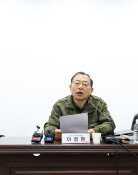New Administrative City Law Creates Constitutional Controversy
New Administrative City Law Creates Constitutional Controversy
Posted February. 28, 2005 22:38,
There was controversy between the National Assemblys Legislation and Judiciary Committee lawmakers in a regular session held on Monday, February 28 regarding the unconstitutionality of the law for the new administrative city and when to handle it. Conflict stirred around the need for an additional deliberation for the revised civil law, with the main focus on abolishing hojuje, the traditional family registry system.
The Legislation and Judiciary Committee passed a law relating debtor revival and bankruptcy (unified insolvency bill), a class action bill for securities, and the KIC bill (the bill to launch the Korea Investment Corporation), and handed it over to National Assemblys regular meeting, which will be held on March 2.
Controversy in ruling and opposition parties-
The Uri Party states that the law for the new administrative city is not unconstitutional, and is intent on passing this bill in the upcoming regular meeting on March 2.
However, the Grand National Party (GNP) is repeatedly pressing that the bill should be handed over to the legislation and judiciary committees sub-committee to be considered in regards to the possibility of its being unconstitutional, and then should be handled in a special session held in April.
GNP lawmaker Chang Yoon-seok asked Minister Kang Dong-suk of the Construction and Transportation Ministry, who was present at the committee meeting, The unconstitutionality of the new administrative city law is being strongly raised, and do you have any intention to advise the Korean Constitutional Law Association?
Kang replied, The Justice Ministry has stated that there is no unconstitutionality issue, and there has already been an in-depth discussion over the matter in the ad hoc committee for the new administrative capital and the construction and transportation committee.
Rep. Kim Han-gill, head of the ad hoc committee, backed the reply, saying, The National Assembly should not shrivel their legislative power by the unconstitutionality controversy.
However, GNP lawmakers Kim Jae-kyoung and Joo Ho-young refuted this, saying, Most of the people are not sympathizing (with the construction of the new administrative city), and a lawsuit will be filed to the Constitutional Court for certain. If the legislation and judiciary committee does not thoroughly inquire into the matter, the Constitutional Court may rule against the law.
Uri Party lawmakers Choi Jae-cheon and Woo Yoon-keun brought out the counterargument that during the time when the Constitutional Court ruled against the capital relocation law, the decentralization placement for governmental organizations was not unconstitutional.
The controversy could not be concluded in the end, and Chairman Choi Yeon-hee (GNP) of the legislation and judiciary committee decided to continue deliberation on the issue after finishing the deliberation of other bills.
At the committee meeting, the GNPs Lee Jae-oh, Kim Moon-soo, Park Kye-dong and Bae Il-do, who are opposed to passing the bill, watched over the meeting in the adviser seats, and pressed the legislation and judiciary committee lawmakers. Some lawmakers shouted out Theres nothing different from the law ruled unconstitutional, and were restrained by Chairman Choi.
Relating to the revised bill for the civil law, GNP lawmakers Kim Seong-jo and Joo Ho-young proposed to delay the proceedings, saying, The new family registration system following the abolishment of the current hojuje system is not yet definite.
Democratic Labor Party Rep. Roh Hoe-chan opposed this, replying, There have already been several discussion sessions over this matter, and there is no need to delay.
Unified insolvency law-
The minimum repayment system, in which three to five percent of the entire debt with a limit of 30 million won at the highest must be repaid when there is an objection from a creditor such as a financial institution to the repayment plan, will be included in the law. The individual debt adjustment committee, which was to aid in adjusting for the debt amount before an individual debtor received court judgment, will not be created, and the Credit Counseling and Recovery Service autonomously established by the financial institutions will continue in taking over the role.
Class action bill for securities-
The main focus is that if companies open to the public their account books to defuse their past window dressing, they will be excluded from class action of that certain window dressing until the end of 2006. The accounting firm and the accountants of that certain company will also be excluded. The subjects to class action will be reduced to false public notifications, and not just simply past window dressings.
Myoung-Gun Lee gun43@donga.com







